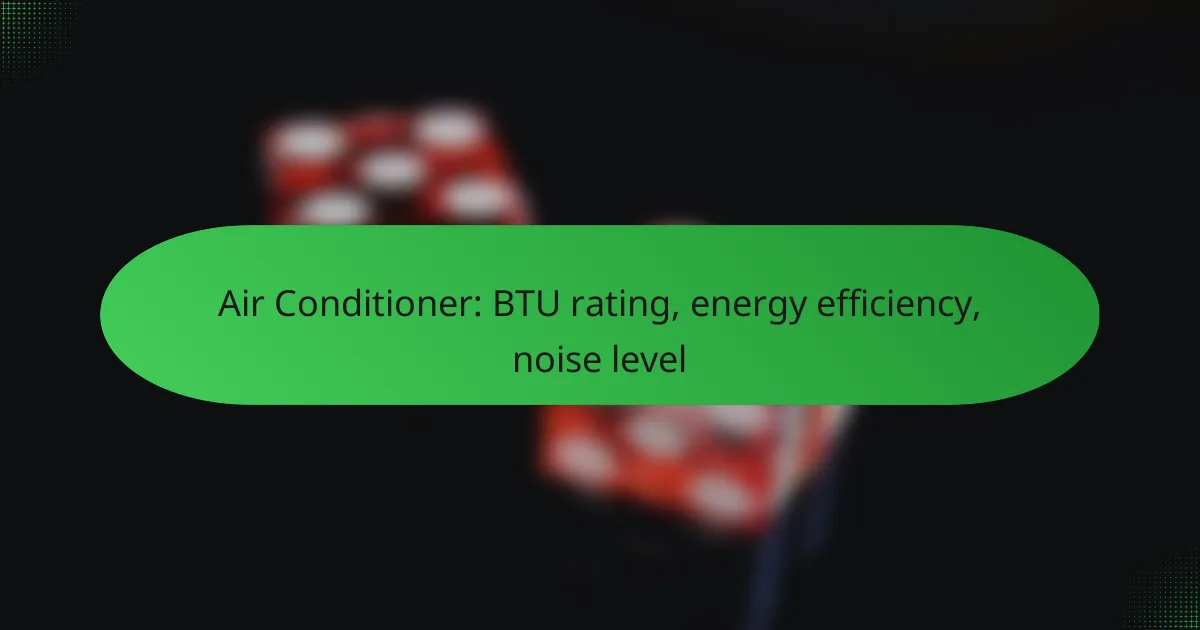When choosing an air conditioner, understanding BTU ratings, energy efficiency, and noise levels is essential for optimal performance and comfort. The BTU rating determines the unit’s cooling capacity, while energy efficiency influences both operating costs and environmental impact. Additionally, considering the noise level can enhance your living or working space by ensuring a quieter environment.

How to choose the right BTU rating for air conditioners in the UK?
Selecting the appropriate BTU rating for air conditioners in the UK is crucial for effective cooling and energy efficiency. The BTU (British Thermal Unit) rating indicates the cooling capacity of the unit, and choosing the right one ensures comfort without excessive energy use.
Room size considerations
The size of the room directly influences the BTU rating needed for an air conditioner. Generally, for a standard room of around 100 square feet, a unit with a BTU rating of approximately 5,000 to 6,000 is suitable. Larger spaces require higher BTU ratings; for instance, a room of 200 square feet may need between 8,000 and 10,000 BTUs.
To determine the ideal BTU rating, measure the room’s square footage and consider factors such as ceiling height, insulation quality, and the number of windows. A well-insulated room may require fewer BTUs, while a poorly insulated one may need more.
Climate impact on BTU needs
The local climate significantly affects the BTU requirements for air conditioning. In warmer regions of the UK, such as the southeast, higher BTU ratings may be necessary to maintain comfort during hot spells. Conversely, areas with milder climates may require less cooling capacity.
Additionally, consider seasonal variations. During particularly hot summers, you might need a unit with a higher BTU rating to cope with increased temperatures, while a standard rating may suffice during cooler months.
Common BTU ratings for residential units
Residential air conditioners typically come in various BTU ratings to accommodate different room sizes and cooling needs. Common ratings include 5,000 BTUs for small rooms, 7,000 to 8,000 BTUs for medium-sized rooms, and 10,000 to 12,000 BTUs for larger spaces.
When selecting a unit, refer to the manufacturer’s specifications and guidelines to ensure you choose a model that aligns with your room size and cooling requirements. This will help avoid underperformance or excessive energy consumption.

What is the importance of energy efficiency in air conditioners?
Energy efficiency in air conditioners is crucial as it directly affects operating costs and environmental impact. Higher efficiency ratings mean lower electricity bills and reduced energy consumption, making it a key factor in purchasing decisions.
Energy Efficiency Ratio (EER) explained
The Energy Efficiency Ratio (EER) measures an air conditioner’s cooling output in British Thermal Units (BTUs) per hour divided by its energy consumption in watts. A higher EER indicates better efficiency, meaning the unit provides more cooling for less energy. Typically, EER ratings range from around 8 to 12 for residential units.
When selecting an air conditioner, consider the EER as it reflects performance during peak cooling times. Units with an EER of 10 or higher are generally considered efficient.
Seasonal Energy Efficiency Ratio (SEER) significance
The Seasonal Energy Efficiency Ratio (SEER) represents an air conditioner’s efficiency over an entire cooling season, factoring in varying temperatures. It is calculated by dividing the total cooling output in BTUs by the total energy consumed in watt-hours. SEER ratings usually range from 13 to 21 for residential models.
A higher SEER rating indicates greater efficiency and potential savings on energy bills. In many regions, air conditioners must meet a minimum SEER rating set by regulations, often around 14 for new units.
Benefits of high-efficiency models
High-efficiency air conditioners offer several advantages, including lower energy costs, reduced environmental impact, and improved comfort. These models often feature advanced technologies that enhance performance and reliability.
Investing in a high-efficiency unit can lead to significant savings over time, especially in climates with long cooling seasons. Additionally, many utility companies provide rebates or incentives for purchasing energy-efficient appliances, further offsetting initial costs.

How does noise level affect air conditioner selection?
Noise level is a crucial factor in air conditioner selection, as it impacts comfort and usability. A quieter unit can enhance the living environment, especially in bedrooms or workspaces, while louder models may be disruptive.
Decibel ratings and comfort levels
Decibel (dB) ratings indicate the noise level of air conditioners, with lower numbers signifying quieter operation. For example, units operating at 50-60 dB are generally considered acceptable for residential use, while anything above 70 dB can be disruptive. Understanding these ratings helps consumers choose models that align with their comfort preferences.
In practical terms, a 50 dB air conditioner is comparable to a quiet conversation, while a 70 dB unit resembles the sound of a vacuum cleaner. Selecting a model with a lower dB rating is advisable for noise-sensitive environments.
Quiet models available in the UK market
The UK market offers a variety of quiet air conditioning models designed for residential and commercial use. Brands like Daikin and Mitsubishi Electric feature units with noise levels as low as 19 dB, making them suitable for bedrooms and offices.
When shopping, look for energy-efficient models that advertise their noise levels prominently. Many retailers provide specifications that include both BTU ratings and sound levels, allowing for informed comparisons.
Noise reduction technologies
Modern air conditioners incorporate several noise reduction technologies to enhance user experience. Features such as insulated compressor compartments and variable-speed fans help minimize operational noise.
Additionally, some units use inverter technology, which allows the compressor to adjust its speed based on cooling demand, resulting in quieter performance. When selecting an air conditioner, consider models that highlight these advancements for improved noise control.

What are the key factors in selecting an air conditioner?
When selecting an air conditioner, key factors include BTU rating, energy efficiency, and noise level. Understanding these elements helps ensure you choose a unit that meets your cooling needs while being cost-effective and comfortable.
Budget considerations
Your budget plays a crucial role in selecting an air conditioner. Prices can vary significantly based on features, brand, and efficiency ratings, typically ranging from a few hundred to several thousand dollars. Consider not only the initial purchase price but also long-term operating costs, including electricity bills and maintenance.
To maximize your investment, look for units with high energy efficiency ratings (EER or SEER) that may have a higher upfront cost but save you money over time. Additionally, check for any available rebates or tax credits that can offset the purchase price.
Brand reliability and reviews
Choosing a reliable brand can significantly impact your satisfaction with an air conditioner. Research brands known for durability and customer service, and read reviews to gauge user experiences. Look for brands that consistently receive high ratings for performance and reliability.
Consider models with warranties that reflect the manufacturer’s confidence in their product. A good warranty can save you money on repairs and provide peace of mind regarding your investment.
Installation requirements
Installation requirements can vary widely between different air conditioning units. Some models are designed for easy DIY installation, while others may require professional help, which can add to your overall cost. Ensure you understand the installation process and any necessary modifications to your home, such as electrical upgrades or ductwork.
Check local building codes and regulations to ensure compliance during installation. If hiring a professional, obtain multiple quotes to find a reputable installer at a fair price, and confirm they are familiar with the specific model you choose.

How do air conditioner features impact performance?
The features of an air conditioner significantly influence its performance, including cooling efficiency, energy consumption, and noise levels. Understanding these features can help consumers make informed decisions that align with their comfort needs and budget constraints.
Smart technology integration
Smart technology in air conditioners allows for enhanced control and efficiency. Features such as Wi-Fi connectivity enable users to adjust settings remotely via smartphone apps, optimizing energy use based on occupancy patterns.
Additionally, smart thermostats can learn user preferences and automatically adjust temperatures, potentially reducing energy bills by 10-20%. When selecting a unit, consider models that offer compatibility with home automation systems for improved convenience.
Variable speed compressors
Variable speed compressors adjust their cooling output based on the current temperature, leading to more consistent comfort and reduced energy consumption. Unlike traditional single-speed compressors that operate at full capacity or not at all, variable speed models can operate at lower speeds for longer periods, enhancing efficiency.
These systems can improve energy efficiency ratings by 20-30% compared to fixed-speed units. When evaluating options, look for air conditioners with variable speed technology to maximize performance and minimize noise.
Filtration systems and air quality
Advanced filtration systems in air conditioners help improve indoor air quality by capturing dust, allergens, and pollutants. HEPA filters, for example, can trap particles as small as 0.3 microns, making them effective for allergy sufferers.
Regular maintenance of these filtration systems is crucial; filters should be checked and replaced every few months to maintain optimal performance. Consider air conditioners with washable filters for ease of maintenance and long-term cost savings.

What are the emerging trends in air conditioning technology?
Emerging trends in air conditioning technology focus on energy efficiency, eco-friendly refrigerants, and smart features. These advancements aim to reduce environmental impact while enhancing user comfort and convenience.
Eco-friendly refrigerants
Eco-friendly refrigerants are gaining traction as manufacturers shift away from traditional substances that contribute to ozone depletion and global warming. New refrigerants, such as hydrofluoroolefins (HFOs) and natural options like propane, have lower global warming potential (GWP) and are more sustainable.
When selecting an air conditioning unit, consider the type of refrigerant it uses. Look for models that comply with the latest environmental regulations, such as the European F-Gas Regulation, which aims to phase down high-GWP refrigerants. This not only helps the planet but can also enhance system efficiency.
In practical terms, units using eco-friendly refrigerants may be slightly more expensive upfront, but they often lead to lower energy bills and reduced environmental impact over time. Always check for certifications that indicate compliance with eco-friendly standards.
